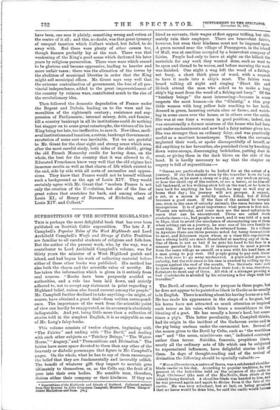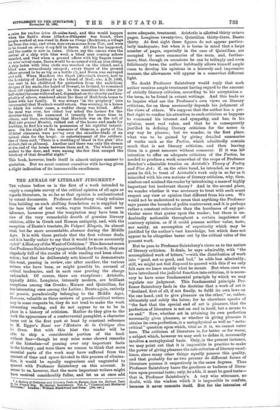SUPERSTITIONS OF THE SCOTTISH HIGHLANDS.* THIS is perhaps the most
delightful book that has ever been published on Scottish Celtic superstition. The late J. F. Campbell's Popular Tales of the West Highlands and Lord Archibald Campbell's Waifs and Strays of Celtic Tradition are familiar to all careful students of religions and folk-lore. But the author of the present work, who, by the way, was a contributor to Lord Archibald Campbell's volume, was for thirty years the minister of a West Highland parish and island, and had begun his work of collecting material before either of these other books was published. His method has also both the charm and the scientific value of novelty. He has taken the information which is given in it entirely from oral sources. " Books have been purposely avoided as authorities, and a rule has been laid down, and strictly adhered to, not to accept any statement in print regarding a Highland belief, unless also found current among the people." Mr. Campbell further declined to take anything—he might, of course, have obtained a great deal—from written correspond- ence. The importance of the work from the scientific point of view can hardly be exaggerated, as its accuracy is absolutely indisputable. And yet, being little more than a collection of stories told in the simplest English, it is as enjoyable as one of Mr. Lang's fairy-books.
'This volume consists of twelve chapters, beginning with "The Fairies " and ending with " The Devil," and dealing with such other subjects as " Tutelary Beings," " The Water- Horse," " Augury," and " Premonitions and Divination." The fairies have more space devoted to them than any other of the heavenly or diabolic personages that figure in Mr. Campbell's pages. On the whole, what he has to say of them encourages the belief that they are fundamentally and incurably selfish. The benefit of whatever gift they impart to mortals goes ultimately to themselves, or, as the Celts say, the fruit of it goes into their own bodies. No sensible man, therefore, desires either their company or their kindness. If they are
Superstitions of the Highlands and islands of Scotland. Collected entirely from Orel Sources by John Gregoreon Campbell, Minister of Tires. Glasgow James MaeLehose and Sons. [6s.1
hired as servants, their wages at first appear trifling, but ulti.
mately ruin their employer. There are benevolent fairies, however, but even their kindness must not be imposed upon.
A green mound near the village of Pennygown, in the island of Mull, was at one time occupied by a benevolent company of fairies. People had only to leave at night on the hillock the materials for any work they wanted done, such as wool to be spun and thread to be woven, and before morning the work was finished. One night a wag left the wood of a fishing- net buoy, a short thick piece of wood, with a request to have it made into a ship's mast. The fairies were heard talking all night and singing " Short life and ill-luck attend the man who asked us to make a long ship's big mast from the wood of a fishing-net buoy." Of the "tutelary beings" the most interesting—because in some respects the most human—is the " Glaistig," a thin grey little woman with long yellow hair reaching to her heels.
dressed in green, haunting certain sites or farms, and watch- ing in some cases over the house, or in others over the cattle. She was at one time a woman in good position; indeed, she was occasionally a former mistress of the house who had been put under enchantments and now had a fairy nature given her, She was stronger than an ordinary fairy, and was practically useful as a martinet housekeeper. Thus, when the servants neglected their work, or spoke disrespectfully of herself, or did anything to her favourites, she punished them by knocking down water-stoups, disarranging bedclothes, putting dust in meat, or giving them in the dark blows on the side of the head. It is hardly necessary to say that the chapter on augury is full of superstitions :—
"Omens are particularly to be looked for at the outset of a journey. If the first animal seen by the traveller have its lack towards him, or he meet a sheep or a pig, or any unclean animal, or hear the shrill cry of the curlew,-or see a heron, or he himself fall backward, or his walking-stick fall on the road, or he have to turn back for anything he has forgot, he may as well stay at home that day ; his journey will not prosper. A serpeat, a rat, or a mouse is unlucky unless killed, but if killed becomes a good omen. If the face of the animal be towards one, even in the case of unlucky animals, the omen becomes leas inauspicious. It is of great importance what person is first met. Women are unlucky, and some men are the most unfortunate omen that can be encountered. These are called drool& comhalaichean—i.e., bad people to meet, and it was told of a man in Skye, that to avoid the mischance of encountering one of them when setting out on a journey, he sent one of his own family to meet him. If he met any other, he returned home. In a village in Ayrshire there are three persons noted for being inauspicious to meet, and fishermen (upon whom as a class this superstition has a strong hold) are much dissatisfied at meeting any of them. One of them is not so bad if he puts his hand to his face in a manner peculiar to him. It is inauspicious to meet a person from the same village as oneself, or a man with his head bare, or a man going to pay rent. Old people going to pay rent, there- fore, took care to go away unobserved. A plain-soled person is unlucky, but the evil omen in his case is averted by rolling up the tongue against the roof of the mouth. The Stewarts were said to have insteps ; water flowed below their foot ; it was, therefore, fortunate to meet any of them. All risk of a stranger proving a bad enthalaiche is avoided by his returning a few steps with the traveller."
The Devil, of course, figures to purpose in these pages, but he does not appear to be painted so black in Gaelic as he usually is in English. There is nothing about his having horns or a tail He has made his appearance in the shape of a he-goat, but his horns have not attracted so much attention or inspired such terror as his voice, which bears a resemblance to the bleating of a goat. He has usually a horse's hoof, but some- times a pig's. This latter peculiarity, Mr. Campbell thinks, had its origin in the incident of the Gadarene swine and in the pig being unclean under the ceremonial law. Several of the names given to the Devil by Celts, such as " the worthless one" and " the mean, mischievous one," indicated contempt rather than terror. Suicides, funerals, propitious times, nearly all the ordinary acts of life which can be subjected to supernatural influences, have delightful stories told of them. In days of thought-reading and of the revival of divination the following should be specially valuable :—
" Mac-a-Chreachairs, a native of Barra, was a celebrated shoulder- blade reader in his day. According to popular tradition, he was present at the festivities held on the occasion of the castle at Bagh Chidsomul (the seat of the MacNeills, then chiefs of the island) being finished. A shoulder-blade was handed to him, and he was pressed again and again to divine from it the fate of the castle. He was very reluctant, but at last, on being promised that no harm would be done him, he said the castle would become a cairn for rushes (cdrn dhruideachun), and this would happen when the Battle stone (Mach-a-Ph/again) was found, when people worked at sea-weed in Bails na Creige (Rocktown, a village far from the sea), and when deer swam aerate from 'Gist, and were to be found on every dung-hill in Barra. All this has happened, and the castle is now in ruins. Others say the omens were the arrival of a ship with blue wool, a blind man coming ashore unaided, and that when a ground officer with big fingers (maor na miar more) came, Barra would be measured with an iron string. A ship laden with blue cloth was wrecked on the island, and a blind man miraculously escaped ; every finger of the ground officer proved to be as big as a bottle (!), and Thirra was surveyed and sold. When Murdoch the Short (Murchadh Gear,-), heir to the Lordship of Lochbuy in the Island of Mull, circ. A.D. 1400, was sent in his childhood for protection from the ambitious designs of his uncle, the Laird of Dowart, to Ireland, he remained there till eighteen years of age. In the meantime his sister (or half-sister) became widowed and, dependent on the charity and hos- pitality of others, wandered about the Ross of Mull from house to house with her family. It was always in the prophecy' (Ian tairgneachd) that Murdoch would return. One evening, in a house to which his sister came, a wedder sheep was killed. After the meal was over, her eldest boy asked the farmer for the shoulder-blade. He examined it intently for some time in silence, and then, exclaiming that Murdoch was on the soil of Mull (air grunnd Mhuile), rushed out of the house and made for Lochbuy, to find his uncle in possession of his rightful inherit- ance. On the night of the massacre of Glencoe, a party of the ill-fated clansmen were poring over the shoulder-blade of an animal slain for the hospit As entertainment of the soldiers. One of them said, There is a shedding of blood in the glen ' (the dor' tadh fail sa ghleartn). Another said there was only the stream at the end of the house between them and it. The whole party rushed to the door, and were among the few that escaped the butchery of that dreadful night."
This book, however, lends itself in almost unique manner to quotation. But we must content ourselves with having given a slight indication of its innumerable excellences.



























































 Previous page
Previous page